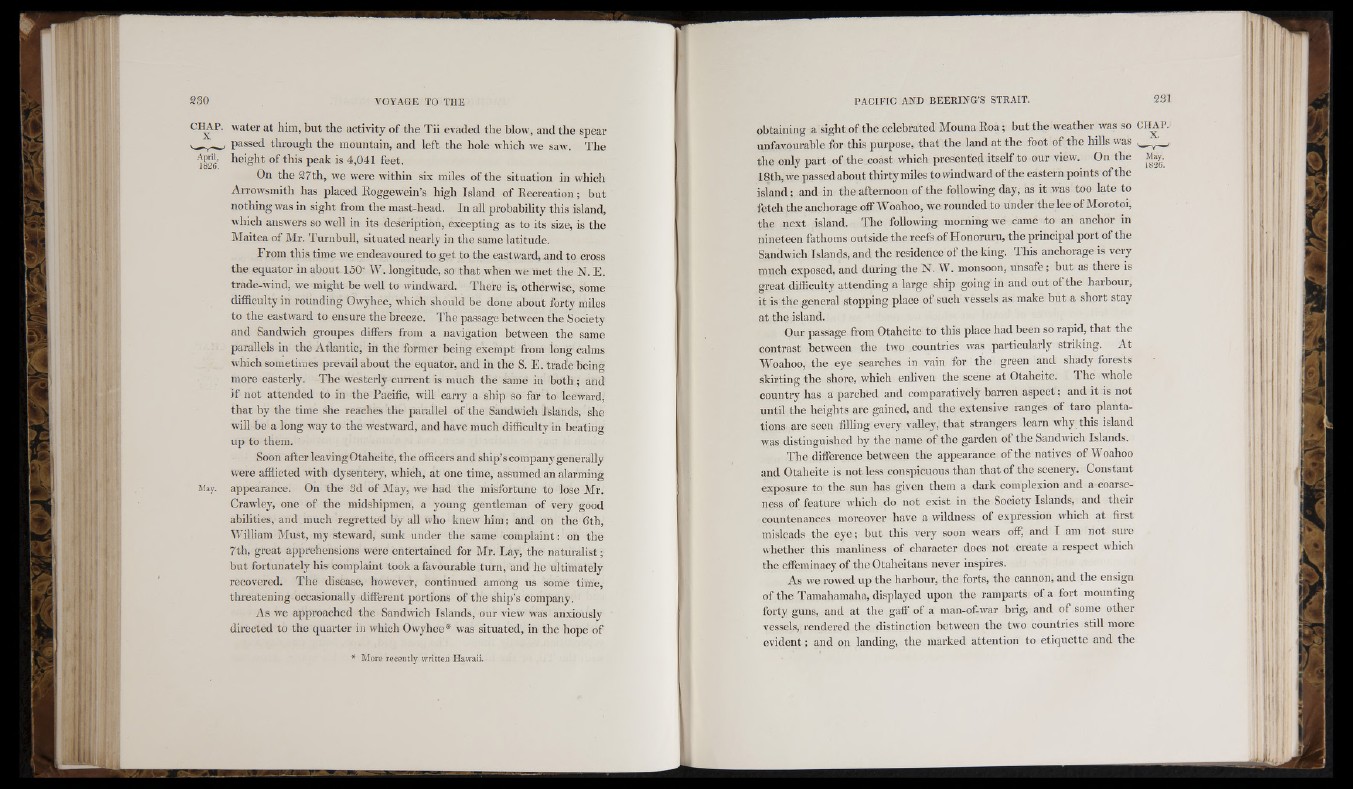
C IEV P . water at him, but the activity of tlie Tii evaded the blow', and the spear
passed through the mountain, and left the hole which we saw. The
■i8”6 is 4,041 feet.
On the 27th, we were within six miles of the situation in which
Arrowsmith has placed Roggewein's high Island of Recreation; but
nothing was in sight from the mast-head. In all probability this island,
which answers so well in its description, excepting as to its size, is the
Maitea of Mr. Turnbull, situated nearly in the same latitude.
From this time we endeavoured to get to the eastward, and to cross
the equator in about 150° AV. longitude, so that when w'e met the N. E.
trade-wind, we might be well to windward. There is, otherwise, some
difficulty in rounding Owyhee, which should be done about forty miles
to the eastivard to ensure the breeze. The passage between the Society
and Sandwich groupes differs from a navigation between the same
parallels in the Atlantic, in the former being exempt from long calms
w hich sometimes prevail about the equator, and in the S. E . trade being
more easterly. The westerly current is much the same in both; and
if not attended to in the Pacific, will carry a ship so far to leeward,
that by the time she reaches the parallel of the Sandwich Islands, she
will be a long way to the westward, and have much difficulty in beating
up to them.
Soon after leaving Otaheite, the officers and ship’s company generally
were afflicted w'ith dysentery, which, at one time, assumed an alarming
May. appearance. On the Sd of May, w'e had the misfortune to lose Mr.
Crawley, one of the midshipmen, a young gentleman of very good
abilities, and much regretted by all w'ho knew him; and on the Cth,
AA"illiam Must, my steward, sunk under the same complaint: on the
7th, great apprehensions were entertained for Mr. Lay, the naturalist;
but fortunately his complaint took a favourable turn, and he ultimately
recovered. The disease, however, continued among us some time,
threatening occasionally different portions of the ship’s company.
vis we approached the Sandwich Islands, onr view was anxiously
directed to the quarter in which Owyhee* was situated, in the hope of
» More recently written Hawaii.
obtaining a sight of the celebrated Mouna Roa; but the weather was so CHAP.
unfavourable for this purpose, that the land at the foot of the hills was .— ^
the only part of the coast which presented itself to our view. On the May,
1 Sth, we passed about thirty miles to windward of the eastern points of the
island; and in the afternoon of the following day, as it was too late to
fetch the anchorage off Woahoo, we rounded to under the lee of Morotoi,
the next island. The following morning we came to an anchor in
nineteen fathoms outside the reefs of Honoruru, the principal port of the
Sandwich Islands, and the residence of the king. This anchorage is very
much exposed, and during the N. W. monsoon, unsafe; but as there is
great difficulty attending a large ship going in and out of the harbour,
it is the general stopping place of such vessels as make but a short stay
at the island.
Our passage from Otaheite to this place had been so rapid, that the
contrast between the tw'o countries was particularly striking. At
Al’oahoo, the eye searches in vain for the green and shady forests
skirting the shore, w'hich enliven the scene at Otaheite. The whole
country has a parched and comparatively barren aspect; and it is not
until the heights are gained, and the extensive ranges of taro plantations
are seen filling every valley, that strangers learn why this island
was distinguished by the name of the garden of the Sandwich Islands.
The difference between the appearance of the natives of \A oahoo
and Otaheite is not less conspicuous than that of the scenery. Constant
exposure to tlie sun has given them a dark complexion and a coarseness
of feature which do not exist in the Society Islands, and their
countenances moreover have a w'ildness of expression which at first
misleads the eye; but this very soon wears oft; and I am not sure
whether this manliness of character does not create a respect which
the effeminacy of the Otaheitans never inspires.
As we rowed up the harbour, the forts, the cannon, and the ensign
of the Tamahamaha, displayed upon the ramparts of a fort iiioimting
forty guns, and at the gaff of a man-of-war brig, and of some other
vessels, rendered the distinction between the tw'o countries still more
evident; and on landing, the marked attention to etiquette and the